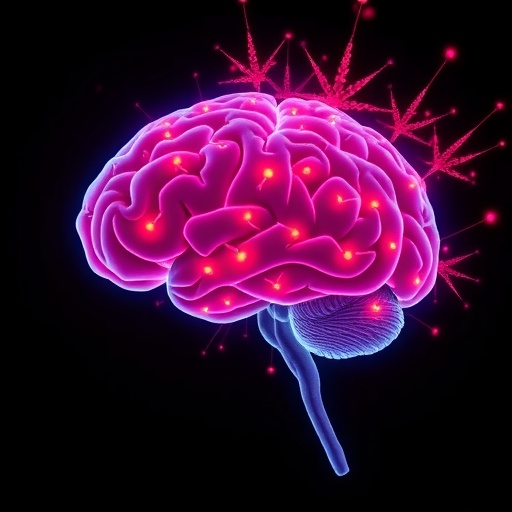A recent controlled clinical trial published in JAMA Psychiatry offers critical insights into the interplay between high-intensity interval training (HIIT) and cannabis use disorder, challenging existing assumptions about exercise as a straightforward intervention for cognitive and mental health impairments associated with cannabis consumption. Although exercise has long been touted as a panacea for a variety of substance use disorders, this rigorously designed study reveals that engaging in a 12-week HIIT protocol does not significantly enhance hippocampal integrity or ameliorate the cognitive deficits and mental health challenges sustained by ongoing cannabis use.
The hippocampus, a brain region intimately tied to memory formation and cognitive processing, has been a focal point in addiction neuroscience. Chronic cannabis use is known to affect this region detrimentally, with earlier studies postulating that physical exercise might promote neurogenesis or neural repair pathways to counter these effects. However, the data from this intervention trial paint a more nuanced picture. Despite participants’ adherence to a structured regimen of intense exercise, measurable improvements in hippocampal volume or function were not observed, reflecting the complex neurobiological landscape shaped by persistent cannabis exposure.
Interestingly, the trial underscores a notable behavioral outcome: individuals with diagnosed cannabis use disorder can successfully engage in sustained, regular physical exercise programs. This finding has critical implications for treatment paradigms, suggesting that prescribing exercise is feasible and acceptable for this population, notwithstanding the absence of direct cognitive or neurobiological benefits. The capacity to adhere to intensive training regimens opens avenues to leverage exercise as a supplementary therapeutic strategy, particularly given its broad-spectrum benefits for physical health and well-being.
A particularly promising dimension emerging from the study is the observation that exercise may play a meaningful role in mitigating cannabis craving—a cardinal symptom underpinning relapse risk. By attenuating craving intensity, physical activity could indirectly contribute to improved outcomes in cannabis use disorder treatment, possibly by modulating reward circuitry or stress response systems. This aligns with growing evidence that exercise-induced neurochemical changes, such as elevations in endorphins and endocannabinoids, might influence addictive behaviors.
The methodology employed in this trial deserves emphasis for its robustness. Utilizing state-of-the-art neuroimaging techniques to assess hippocampal integrity provided objective and quantitative measurements, exceeding the reliance on self-reports or indirect cognitive assessments commonly found in earlier studies. Such precision strengthens the validity of these findings and helps disentangle the complex relationships between exercise, brain structure, and cannabis-related cognitive dysfunction.
Moreover, the selected HIIT intervention protocol reflected contemporary exercise physiology knowledge, incorporating brief bouts of maximal exertion followed by recovery phases. HIIT is recognized for its efficiency and potent systemic effects, including on cardiovascular health and metabolic regulation, which could theoretically translate into neuroprotective benefits. The absence of significant hippocampal improvement after this rigorous regimen further solidifies the conclusion that cannabis’s neurotoxic effects on the brain may require multifaceted treatment approaches beyond exercise alone.
Importantly, the study also contextualizes these findings within the broader landscape of mental health and substance abuse research. Cannabis use disorder is often accompanied by depressive and anxiety symptoms, cognitive impairments, and social dysfunction, all of which contribute to the chronicity and complexity of the disorder. While exercise is an established adjunctive modality for depression and anxiety, its isolated utility in cannabis-related cognitive dysfunction remains limited, calling for integrative therapeutic frameworks.
These results challenge researchers and clinicians to rethink the role of physical exercise in cannabis use disorder management and encourage further investigation into synergistic effects when combined with pharmacological or behavioral therapies. The trial’s delineation between neurobiological versus behavioral outcomes urges a shift toward personalized intervention plans, recognizing that while exercise alone might not reverse brain structural changes, it could enhance motivation, mood, and craving control.
From a neuropharmacological standpoint, the interaction between cannabis’s psychoactive components—primarily delta-9-tetrahydrocannabinol (THC)—and the endocannabinoid system is complex and likely involves persistent alterations in synaptic plasticity and neurotransmitter systems. The possibility that ongoing cannabis consumption undermines the neurogenic or neurorestorative potential of exercise highlights the need for concurrent strategies that address both substance use cessation and brain health restoration.
Furthermore, the trial’s emphasis on continued cannabis use during the intervention serves as a pragmatic reflection of real-world conditions where cessation is often gradual rather than immediate. This design enhances the ecological validity of the findings, signaling that exercise benefits might be constrained or masked if cannabis exposure persists, thus advocating for integrated cessation support in future exercise-based interventions.
In sum, this pioneering clinical trial adds a vital dimension to addiction science, underscoring the boundaries and potentials of exercise within cannabis use disorder treatment. It confirms that while high-intensity physical exercise does not reverse hippocampal damage or improve cognitive outcomes amidst ongoing cannabis use, it remains a viable and meaningful component of comprehensive care strategies, particularly for its role in craving reduction and the promotion of overall physical and mental well-being.
As cannabis legalization and use rates continue to rise globally, understanding the nuanced effects of adjunctive therapies such as exercise is paramount. This study exemplifies the critical need for methodologically rigorous research designs that parse out the distinct mechanisms through which lifestyle interventions interact with substance use disorders, helping refine evidence-based, patient-centered treatment approaches.
Subject of Research: Effects of high-intensity interval training on hippocampal integrity, cognition, and mental health impairments in individuals with cannabis use disorder.
Article Title: Not provided.
News Publication Date: Not provided.
Web References: Not provided.
References: DOI (10.1001/jamapsychiatry.2025.2319)
Image Credits: Not provided.
Keywords: Physical exercise, Cannabis, Drug abuse, Drug addiction, Adults, Mental health, Cognition, Cognitive disorders, Clinical trials, Psychiatry




